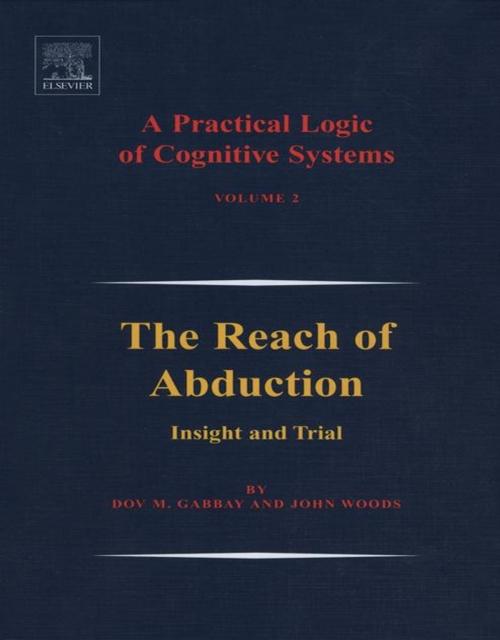A Practical Logic of Cognitive Systems
The Reach of Abduction: Insight and Trial
Nonfiction, Science & Nature, Mathematics, Logic, Health & Well Being, Psychology, Cognitive Psychology| Author: | Dov M. Gabbay, John Woods | ISBN: | 9780080460925 |
| Publisher: | Elsevier Science | Publication: | May 2, 2005 |
| Imprint: | Elsevier Science | Language: | English |
| Author: | Dov M. Gabbay, John Woods |
| ISBN: | 9780080460925 |
| Publisher: | Elsevier Science |
| Publication: | May 2, 2005 |
| Imprint: | Elsevier Science |
| Language: | English |
The present work is a continuation of the authors' acclaimed multi-volume A
Practical Logic of Cognitive Systems. After having investigated the notion of
relevance in their previous volume, Gabbay and Woods now turn to abduction. In
this highly original approach, abduction is construed as ignorance-preserving
inference, in which conjecture plays a pivotal role. Abduction is a response to a
cognitive target that cannot be hit on the basis of what the agent currently knows.
The abducer selects a hypothesis which were it true would enable the reasoner to attain his target. He concludes from this fact that the hypothesis may be conjectured. In allowing conjecture to stand in for the knowledge he fails to have, the abducer reveals himself to be a satisficer, since an abductive solution is not a solution from knowledge. Key to the authors' analysis is the requirement that a conjectured proposition is not just what a reasoner might allow himself to assume, but a proposition he must defeasibly release as a premiss for further inferences in the domain of enquiry in which the original abduction problem has arisen.
The coverage of the book is extensive, from the philosophy of science to
computer science and AI, from diagnostics to the law, from historical explanation to linguistic interpretation. One of the volume's strongest contributions is its exploration of the abductive character of criminal trials, with special attention given to the standard of proof beyond a reasonable doubt.
Underlying their analysis of abductive reasoning is the authors' conception of
practical agency. In this approach, practical agency is dominantly a matter of the
comparative modesty of an agent's cognitive agendas, together with comparatively scant resources available for their advancement. Seen in these ways, abduction has a significantly practical character, precisely because it is a form of inference that satisfices rather than maximizes its response to the agent's cognitive target.
The Reach of Abduction will be necessary reading for researchers, graduate
students and senior undergraduates in logic, computer science, AI, belief dynamics, argumentation theory, cognitive psychology and neuroscience, linguistics, forensic science, legal reasoning and related areas.
Key features:
- Reach of Abduction is fully integrated with a background logic of cognitive systems.
- The most extensive coverage compared to competitive works.
- Demonstrates not only that abduction is a form of ignorance preserving
inference but that it is a mode of inference that is wholly rational.
- Demonstrates the satisficing rather than maximizing character of
abduction.
- The development of formal models of abduction is considerably more extensive than one finds in existing literature. It is an especially impressive amalgam of sophisticated
conceptual analysis and extensive logical modelling.
· Reach of Abduction is fully integrated with a background logic of cognitive systems.
· The most extensive coverage compared to competitive works
· Demonstrates not only that abduction is a form of ignorance preserving
inference but that it is a mode of inference that is wholly rational.
· Demonstrates the satisficing rather than maximizing character of
abduction.
· The development of formal models of abduction is considerably more extensive than one finds in existing literature. It is an especially impressive amalgam of sophisticated
conceptual analysis and extensive logical modelling.
The present work is a continuation of the authors' acclaimed multi-volume A
Practical Logic of Cognitive Systems. After having investigated the notion of
relevance in their previous volume, Gabbay and Woods now turn to abduction. In
this highly original approach, abduction is construed as ignorance-preserving
inference, in which conjecture plays a pivotal role. Abduction is a response to a
cognitive target that cannot be hit on the basis of what the agent currently knows.
The abducer selects a hypothesis which were it true would enable the reasoner to attain his target. He concludes from this fact that the hypothesis may be conjectured. In allowing conjecture to stand in for the knowledge he fails to have, the abducer reveals himself to be a satisficer, since an abductive solution is not a solution from knowledge. Key to the authors' analysis is the requirement that a conjectured proposition is not just what a reasoner might allow himself to assume, but a proposition he must defeasibly release as a premiss for further inferences in the domain of enquiry in which the original abduction problem has arisen.
The coverage of the book is extensive, from the philosophy of science to
computer science and AI, from diagnostics to the law, from historical explanation to linguistic interpretation. One of the volume's strongest contributions is its exploration of the abductive character of criminal trials, with special attention given to the standard of proof beyond a reasonable doubt.
Underlying their analysis of abductive reasoning is the authors' conception of
practical agency. In this approach, practical agency is dominantly a matter of the
comparative modesty of an agent's cognitive agendas, together with comparatively scant resources available for their advancement. Seen in these ways, abduction has a significantly practical character, precisely because it is a form of inference that satisfices rather than maximizes its response to the agent's cognitive target.
The Reach of Abduction will be necessary reading for researchers, graduate
students and senior undergraduates in logic, computer science, AI, belief dynamics, argumentation theory, cognitive psychology and neuroscience, linguistics, forensic science, legal reasoning and related areas.
Key features:
- Reach of Abduction is fully integrated with a background logic of cognitive systems.
- The most extensive coverage compared to competitive works.
- Demonstrates not only that abduction is a form of ignorance preserving
inference but that it is a mode of inference that is wholly rational.
- Demonstrates the satisficing rather than maximizing character of
abduction.
- The development of formal models of abduction is considerably more extensive than one finds in existing literature. It is an especially impressive amalgam of sophisticated
conceptual analysis and extensive logical modelling.
· Reach of Abduction is fully integrated with a background logic of cognitive systems.
· The most extensive coverage compared to competitive works
· Demonstrates not only that abduction is a form of ignorance preserving
inference but that it is a mode of inference that is wholly rational.
· Demonstrates the satisficing rather than maximizing character of
abduction.
· The development of formal models of abduction is considerably more extensive than one finds in existing literature. It is an especially impressive amalgam of sophisticated
conceptual analysis and extensive logical modelling.















